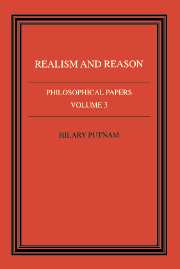Book contents
- Frontmatter
- Contents
- Dedication
- Introduction
- 1 Models and reality
- 2 Equivalence
- 3 Possibility and necessity
- 4 Reference and truth
- 5 ‘Two dogmas’ revisited
- 6 There is at least one a priori truth
- 7 Analyticity and apriority: beyond Wittgenstein and Quine
- 8 Computational psychology and interpretation theory
- 9 Reflections on Goodman's Ways of Worldmaking
- 10 Convention: a theme in philosophy
- 11 Philosophers and human understanding
- 12 Why there isn't a ready-made world
- 13 Why reason can't be naturalized
- 14 Quantum mechanics and the observer
- 15 Vagueness and alternative logic
- 16 Beyond historicism
- Bibliography
- Acknowledgements
- Index
7 - Analyticity and apriority: beyond Wittgenstein and Quine
Published online by Cambridge University Press: 06 January 2010
- Frontmatter
- Contents
- Dedication
- Introduction
- 1 Models and reality
- 2 Equivalence
- 3 Possibility and necessity
- 4 Reference and truth
- 5 ‘Two dogmas’ revisited
- 6 There is at least one a priori truth
- 7 Analyticity and apriority: beyond Wittgenstein and Quine
- 8 Computational psychology and interpretation theory
- 9 Reflections on Goodman's Ways of Worldmaking
- 10 Convention: a theme in philosophy
- 11 Philosophers and human understanding
- 12 Why there isn't a ready-made world
- 13 Why reason can't be naturalized
- 14 Quantum mechanics and the observer
- 15 Vagueness and alternative logic
- 16 Beyond historicism
- Bibliography
- Acknowledgements
- Index
Summary
Both Wittgenstein and Quine have had important insights in connection with the nature of mathematical and logical ‘necessity’, and both have written things that have transformed the discussion of this topic. But it is the burden of this paper to show that the views of both are unacceptable as they stand. I hope that a short and sharp statement of why both sorts of views will not do may help take us to a new stage in the discussion.
Part I: Why mathematical necessity is not explained by human nature, ‘forms of life’, etc.
Wittgensteinian views
Just what Wittgenstein's contention is, in connection with philosophers' opinions, theories, and arguments on the topic of ‘mathematical necessity’, has been a subject of considerable controversy. Clearly he thinks the whole discussion is nonsensical and confused; but why (in his view) it is nonsensical and confused, and whether he offers any explanation at all of why we think there is such a thing as mathematical necessity and of what the difference is between mathematical and empirical statements, is a subject on which there seems to be a great deal of disagreement among his interpreters.
I shall not attempt to do any textual exegesis here. I know what the (several) views of Wittgensteinians are, even if I do not know for sure which, if any, was Wittgenstein's and what I shall try to show is that not even the most sophisticated of these ‘Wittgensteinian’ views is tenable.
- Type
- Chapter
- Information
- Philosophical Papers , pp. 115 - 138Publisher: Cambridge University PressPrint publication year: 1983
- 1
- Cited by



